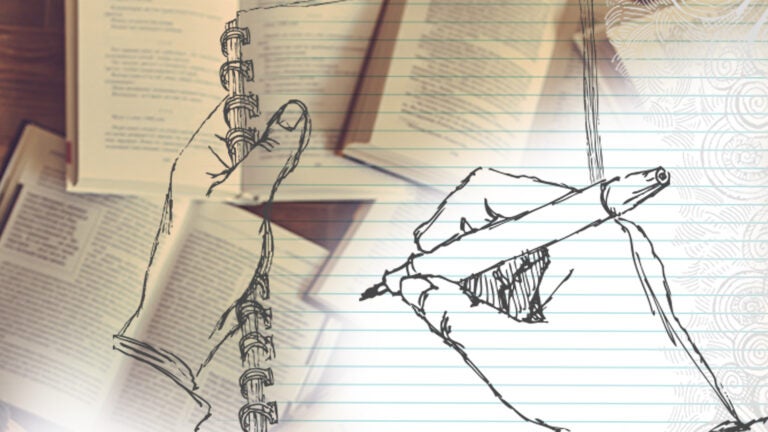
USC students Skype with their favorite authors
Undergrads find inspiration by talking to best-selling writers in a contemporary prose class
Allison Smith will never forget the English class that allowed her to Skype with author and singer-songwriter Rosanne Cash, one of her literary heroes.
“I felt like I was sitting in her kitchen, just having a cup of coffee and chatting,” said Smith, a senior majoring in literature and creative writing at the USC Dornsife College of Letters, Arts and Sciences.
The discussion with Cash was part of “Contemporary Prose,” a course taught by Christopher Freeman, professor (teaching) of English.
“She was so warm and so genuinely engaged, it reminded me of talking to my own mother,” Smith said.
Students in Freeman’s class had already read and discussed Cash’s critically acclaimed book Composed: A Memoir (Viking Press, 2010) and were excited to discuss it with her in person.
“We talked about the writing process and grace, and what it means to be a writer or an artist and create something from the heart,” Smith said. “We talked about how you have to be reflective and really sit with yourself and know yourself.”
The interview was one of two Freeman organized for his students during the course — they also Skyped with celebrated author, musician and educator Warren Zanes, who wrote Tom Petty: The Biography (Henry Holt and Co., 2015).
Austen Le, a sophomore majoring in narrative studies and biochemistry, described both discussions as “incredibly valuable.”
“While we were Skyping with Roseanne, it was hard to believe that she’s the daughter of Johnny Cash, such a huge icon …” he said. “Getting to know her through her book and then being able to speak to her and get more insights that she really wouldn’t have revealed in that memoir just tied everything up in a great big bow.”
What sells now?
Le and Smith were both drawn to Freeman’s course as a breath of literary fresh air.
“So far I’ve been reading a lot of classics and big, thick Victorian novels that inspired contemporary writers. But as a creative writer, I’m writing in contemporary time, so I wanted to be able to be in that headspace of what it’s like to be a contemporary writer,” Smith said.
As writers and students, we have to figure out what sells now, what people are reading, not just what people are writing.
Allison Smith
“As writers and students, we also have to figure out what sells now, what people are reading, not just what people are writing. This class really captures that as well.”
Smith said the opportunity to speak directly with authors was particularly valuable to students who are experimenting and trying to figure out their own styles as young writers.
“Not only do we get to see the style of the writer, but we get insights into their actual writing process and the inspirations — whether books or other people — that go into their work,” she said. “It’s very productive in terms of getting us to think about our own writing process.”
Private lives, public words
In the week before Thanksgiving, the students gathered to talk to Zanes about his biography of Petty.
From a featureless hotel room in Houston, Zanes — who had just addressed a thousand high school students — discussed structure, length and access, the difference between memoir and biography, what it was like to question Petty about intimate topics, and the importance of conflicting viewpoints as he researched and wrote what he described as his “dream project.”
Zanes also spoke about fame and privacy and the fear that comes with revealing hitherto unknown details of your life to a biographer.
“I got to see Petty’s fears about what all that meant,” he said.
However, Zanes added, “I knew I was doing the right thing because I wasn’t betraying him, and I wasn’t showing him to be less of an artist. I was just showing him to be more of a human.”
Similar concerns came up during the discussion with Cash.
“One of my students asked Rosanne about privacy, which she cherishes and guards, and how she reconciled that with writing a ‘revealing’ memoir,” Freeman recalled.
“Rosanne said that she just tried to tell her truth. I said, ‘In publishing the truth of your life, you have reclaimed your privacy, your story.’ She said that was right, which made me feel good, as though Rosanne too had learned something from our conversation, one in which she taught us so much.”
‘A little miracle class’
Freeman’s course covers prose written from the 1960s onward.
“I take ‘prose’ to mean not poetry and not drama. I take “contemporary” to mean since 1960. So I love the freedom I have when selecting our texts,” said Freeman, who organizes the course into clusters. “For instance, there is a World War II unit that includes three very different books united around a common theme.
“The class is very much about writing as well as reading,” he added. “The question is, how do you write a book like this?”
Smith said the engagement of her fellow students had made the course a rich experience.
“We might be a little shy at first, but we know that everybody has important questions and are all great writers,” she said. “It’s really a little miracle class.”
